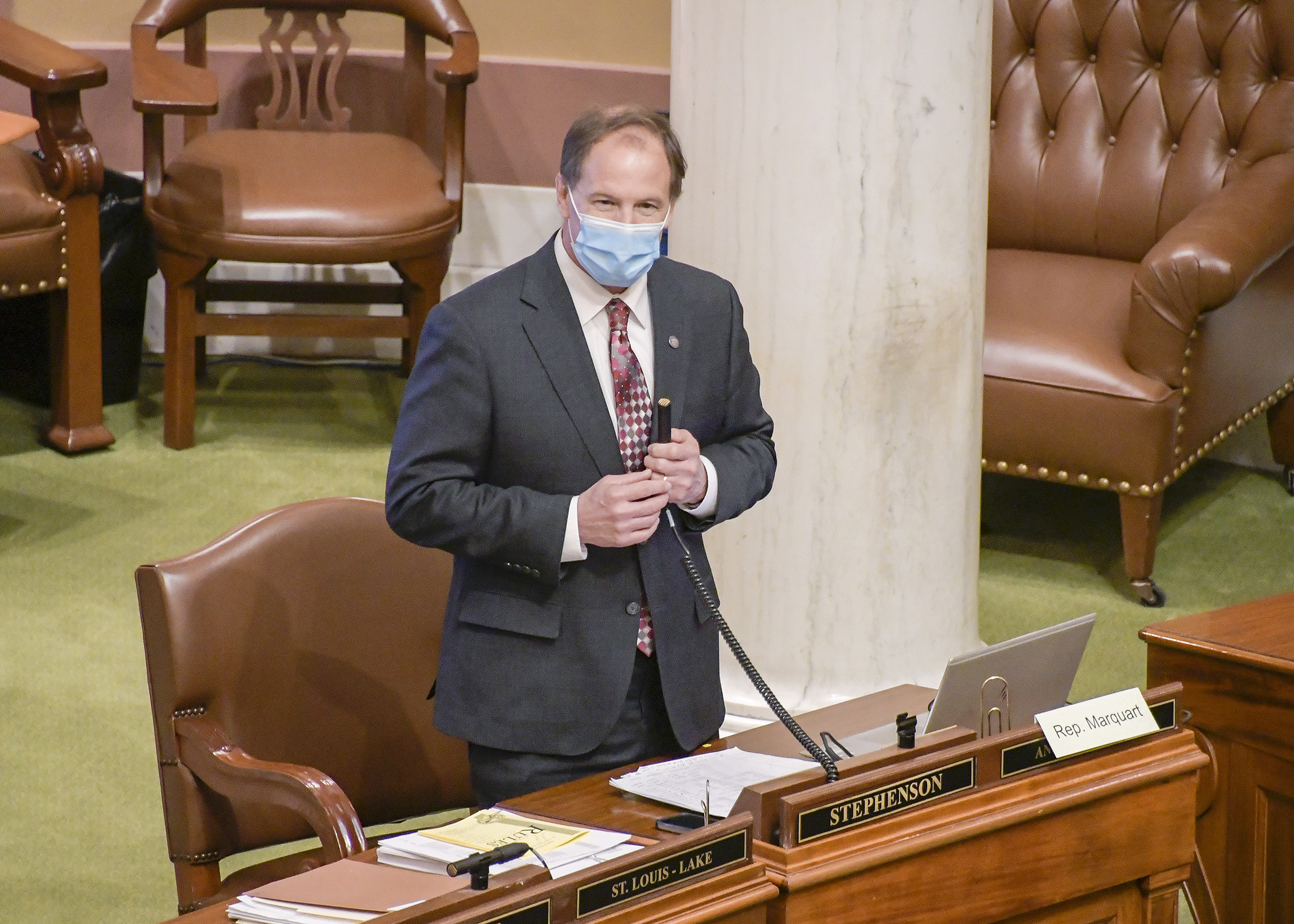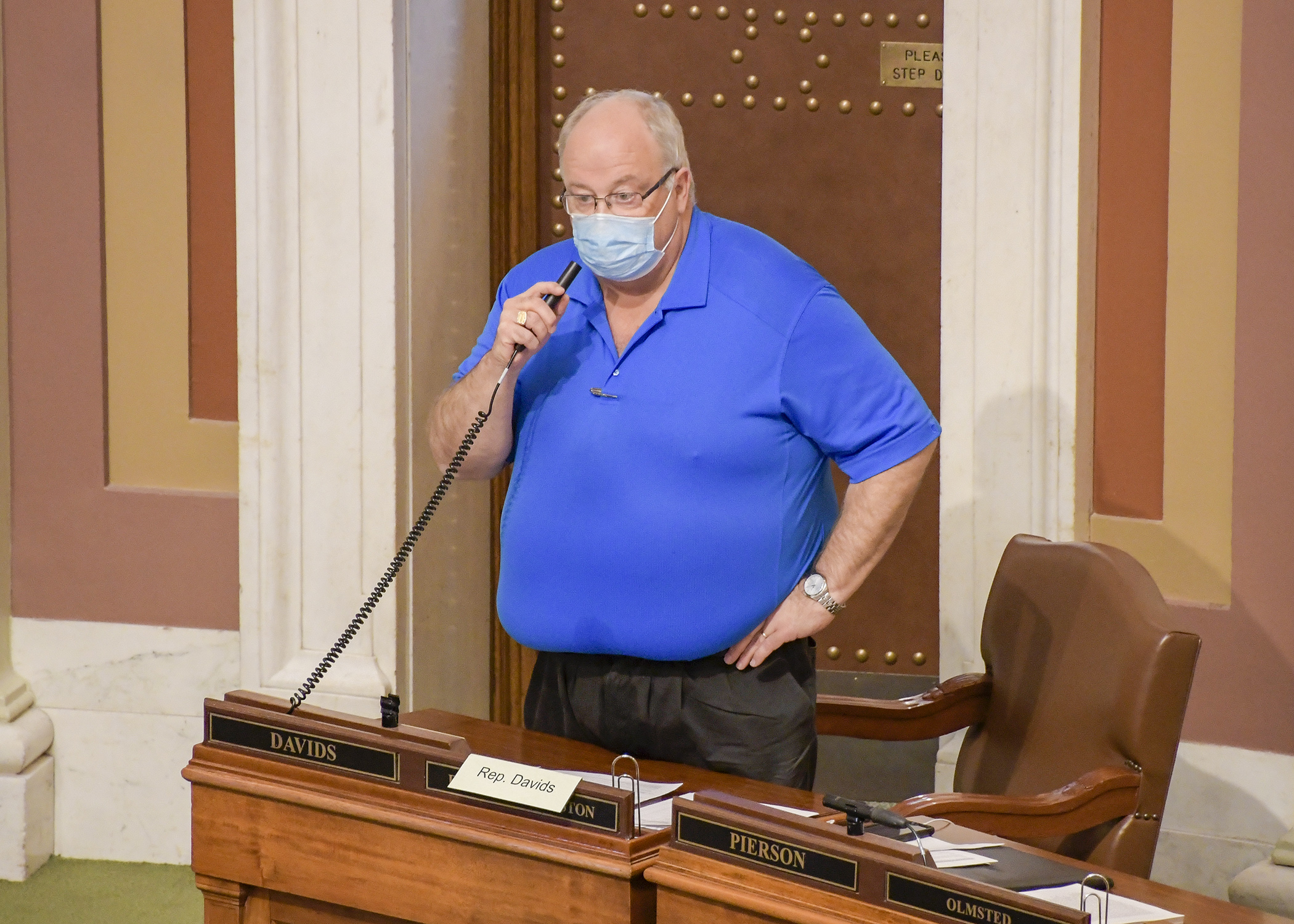In close vote, House passes omnibus tax bill with hikes for high earners, expanded credits

Higher income tax rates for higher earners, recovering corporate profits from foreign tax shelters and providing tax exemptions for businesses and individuals who received federal aid during the pandemic: These are key elements of the omnibus tax bill narrowly passed by the House Thursday.
The vote was 68-66 for HF991, sponsored by Rep. Paul Marquart (DFL-Dilworth).
With the help of several changes to state tax code, it’s projected the bill’s provisions would raise $49.1 billion in revenue for the 2022-23 biennium. It would also provide $4.2 billion in tax refunds, aids and credits for the biennium, leaving $1.74 billion in the state’s budget reserve account and $100 million in the stadium reserve account.
It now goes to the Senate, where Sen. Carla Nelson (R-Rochester) is the sponsor.
“This is a bill that stands up for those who have been hit hardest by COVID-19,” Marquart said. “It provides over $1 billion in tax cuts and aids directly to our families, workers and small businesses. And we pay for it by creating a better tax code that levels the playing field.”
 Rep. Greg Davids, Republican lead on the House Taxes Committee, speaks to the omnibus tax bill prior to passage April 22. Photo by Andrew VonBank
Rep. Greg Davids, Republican lead on the House Taxes Committee, speaks to the omnibus tax bill prior to passage April 22. Photo by Andrew VonBankThe bill would create a new fifth-tier income tax rate of 11.15% on income above $1 million, or $500,000 for single filers. It’s estimated the change would bring in $303.6 million in fiscal year 2022, $564 million in the 2022-23 biennium.
“It also prevents multinational corporations from sheltering profits in offshore tax havens like Bermuda and the Cayman Islands,” Marquart said.
That change in corporate franchise taxes would make all income of a controlled foreign corporation subject to the state’s apportionment formula, or require it to report its worldwide income, which would then be subject to state taxes. It’s estimated this would add $229.6 million to state revenue in fiscal year 2022, $400 million in the 2022-23 biennium.
Marquart also touted an expansion of the Working Family Tax Credit, conformity to federal tax law on unemployment insurance and PPP loans — up to $350,000 per loan — and a county business relief aid program to provide financial support for small businesses that did not receive a PPP loan or did not make a profit in 2020. Those grants would come to $69.7 million in fiscal year 2022.
It’s estimated that the PPP provisions would reduce revenues by $241 million in the next biennium.
Among the refunds, aids and credits, the biggest difference maker on the budgetary bottom line would be creating a tax subtraction for unemployment benefits up to $10,200 for those with gross incomes under $150,000. It would apply only to tax year 2020, but would reduce state revenues by $259.7 million for the next biennium.
The bill would conform to the tax provisions in five federal acts that have become law since December 2019, resulting in a loss to the state’s General Fund of $341.4 million in fiscal year 2022.
“Sixty percent of this bill is tax conformity,” Marquart said. “That’s about $600 million in tax cuts.”
Here are some other key elements:
- a new homelessness prevention fund would provide $25 million in annual aid to counties beginning in fiscal year 2023;
- the Housing Development Fund and Workforce and Affordable Homeownership Development Program would receive $15 million between them in fiscal year 2022;
- it would allow $10 million to be allocated for the small-business investment credit, or “Angel Tax Credit,” for tax year 2022 and extend its sunset by one year;
- the market value exclusion on the statewide property tax would increase from $100,000 to $150,000;
- the state’s tobacco products tax would be expanded to include electronic vapor devices; and
- the bill contains all of the local taxes and tax increment financing provisions included in the House Property Tax Division report.
Action on the bill began with an unusual move: Rep. Greg Davids (R-Preston) proposed a delete-all amendment that would keep most of the bill intact, but would make some alterations. Marquart countered with an amendment to the amendment that would delete almost all of the language in the delete-all amendment. That amendment was approved, and Davids then withdrew his delete-all amendment.
Debate on the bill was clearly divided along party lines. DFL members touted its benefits for those economically struggling, while Republicans objected to its tax increases.
“This bill sends us in the wrong direction,” said Rep. Kristin Robbins (R-Maple Grove). “The fifth tier hurts small businesses who pay their taxes as pass-through businesses. And the corporate provisions would make us the only state in the country to move from a water’s-edge state to worldwide combined reporting. This was tried in the ‘80s, and every state that adopted this rejected it. … Companies will move elsewhere if we incentivize them to do so, as this bill does.”
Rep. Michael Howard (DFL-Richfield) disagrees.
“I went back and watched some debate on the tax bill from 2013,” he said. “It aged very well. We heard a lot of the same themes about job-killing tax increases. ... Yet between 2013 and today, the top earners have made far more. We’re ranked as a great place to live because we invest in it, not because of our tax system. … Minnesotans understand this. Poll after poll shows Minnesotans believe in higher taxes on the wealthy.”
“The bill provides over $1 billion to our families, workers and small businesses,” Marquart said. “It says to them, ‘We’ve got your back.’”
Related Articles
Search Session Daily
Advanced Search OptionsPriority Dailies
Ways and Means Committee OKs proposed $512 million supplemental budget on party-line vote
By Mike Cook Meeting more needs or fiscal irresponsibility is one way to sum up the differences among the two parties on a supplemental spending package a year after a $72 billion state budg...
Meeting more needs or fiscal irresponsibility is one way to sum up the differences among the two parties on a supplemental spending package a year after a $72 billion state budg...
Minnesota’s projected budget surplus balloons to $3.7 billion, but fiscal pressure still looms
By Rob Hubbard Just as Minnesota has experienced a warmer winter than usual, so has the state’s budget outlook warmed over the past few months.
On Thursday, Minnesota Management and Budget...
Just as Minnesota has experienced a warmer winter than usual, so has the state’s budget outlook warmed over the past few months.
On Thursday, Minnesota Management and Budget...